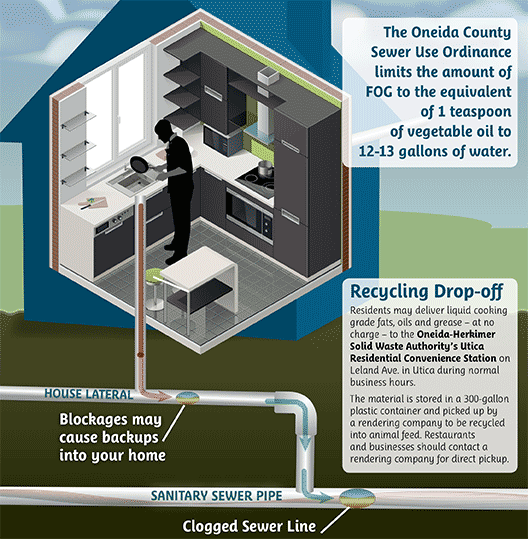FATS, OILS & GREASE
RESIDENTIAL
What is the FOG Program?
Fats, oils and grease (FOG) are used in, or are byproducts of, cooking certain foods. The Oneida County Sewer Use Ordinance limits the amount of FOG to the equivalent of 1 teaspoon of vegetable oil to 12-13 gallons of water. When warm or hot, FOG is often a liquid and may not seem like a big problem. However, after traveling down a sewer drain, these liquids cool and become solid, resulting in clogged pipes that cause sewer overflows and backups into your home. Download our residential brochure for more information.
The Cost of FOG
When FOG builds up in the sanitary sewer system, blockages sometimes occur, causing sewer backups into your home. Not only does it cost a lot of money to clean up the mess in your home, but it also costs to clean out the sewer pipes!
Avoid the Mess!
- Never pour grease, fats or oil down the sink or garbage disposal.
- Recycle liquid cooking oil by collecting it in a container and dropping it off at the Oneida-Herkimer Solid Waste Authority.
- Carefully pour warm fat, oil and grease into jars, cans and/or other containers. Once cooled, dispose of the container in the trash.
- Mix liquid cooking oil with an absorbent material, such as cat litter or coffee grounds, and place in a lidded container for disposal in your trash.
- For greasy dishes, pour off the grease into a container as instructed above and dry wipe the remaining grease prior to washing.
Residents may deliver liquid cooking grade fats, oils and grease – at no charge – to the Oneida-Herkimer Solid Waste Authority’s Utica Residential Convenience Station on Leland Ave. in Utica during normal business hours. The material is stored in a 300-gallon plastic container and picked up by a rendering company to be recycled into animal feed. Restaurants and businesses should contact a rendering company for direct pickup.
A Reminder to Flush Responsibly
Certain materials flushed down toilets can damage sewer systems, wastewater treatment operations, or private septic systems, even when they are labeled as flushable. Correcting the damage is expensive, so do not flush any of the items listed below, no matter how small. Please throw them in the trash.
Get More Info on the FOG Program
If everyone does their part, together we can keep the Mohawk River clean!

